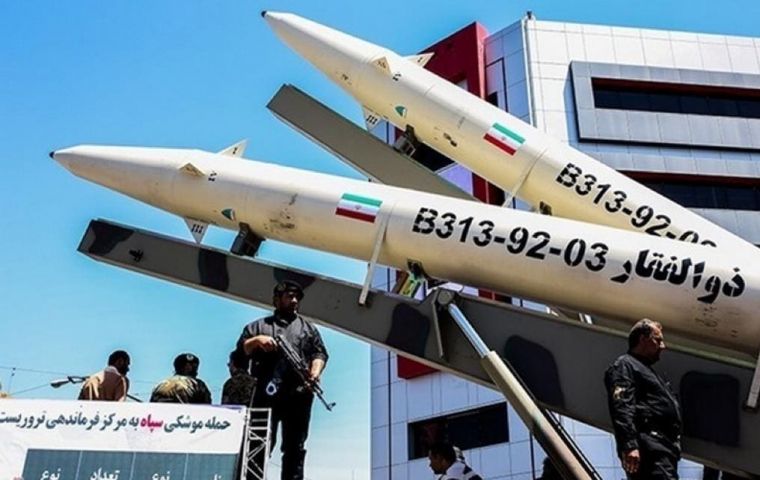MercoPress. South Atlantic News Agency
Iranian attack against Israel deemed imminent
 If materialized, it could spark an all-out war
If materialized, it could spark an all-out war A full-scale Iranian attack against Israel is deemed imminent both in Tel Aviv and Washington DC alike in retaliation for last week's killing of Hamas leader Ismail Haniyeh while in Tehran. US President Joseph Biden was to convene his national security team while Israeli authorities are considering the possibility of switching from a defensive to an offensive strategy.
US Secretary of State Antony Blinken told his G7 colleagues Sunday that an Iranian onslaught could begin within the next 24 to 48 hours. In response, the G7 recalled that recent events have “threatened to ignite a broader conflict” in the Middle East and urged “all involved parties once again to refrain from perpetuating the current destructive cycle of retaliatory violence, to lower tensions and engage constructively toward de-escalation.”
In addition to Haniyeh, Israel has also taken down Hezbollah military chief Fuad Shukr in Beirut.
US Defense Secretary Lloyd Austin discussed with his Israeli counterpart Yoav Gallant the latter's right to self-defense against threats from Iran and its proxies, as well as the steps taken by the US in this regard. According to a statement from Tel Aviv, Gallant briefed Austin on the “security developments in the region and IDF readiness to defend Israel against potential threats posed by Iran and its proxies.” Defensive and offensive scenarios were also reviewed.
Gallant “expressed his appreciation to Secretary Austin for the close military and strategic coordination between Israel and the United States, including the current and future deployment of US military capabilities and force posture changes in defense of Israel,” as well as “highlighted the importance of US leadership in forming a coalition of allies and partners to defend Israel and the region from a range of aerial attacks.”
US General Michael Kurilla, commander of the US Central Command (CENTCOM) was to arrive in Israel Monday, it was also reported.
Tension in the region erupted on Oct. 7, when Hamas launched an unprecedented cross-border attack on Israel in which some 1,200 people were murdered and 251 hostages were taken. In retaliation, Israel launched an offensive against Hamas in the Gaza Strip.
Meanwhile, Iranian authorities conveyed to Israeli Foreign Minister Yisrael Katz through Hungarian diplomatic channels its decision to strike, which could spark an all-out war. Hungarian Foreign Minister Péter Szijjártó called Katz directly to tell him that he had received this information from acting Iranian Foreign Minister Ali Bagheri.
Iran has insisted it legally has “the right” to punish Israel for killing Haniyeh. “We consider our right to defend our national security, our sovereignty, and our territorial integrity as an indisputable right,” Iranian Spokesman Naser Kanani said.
“If the governments of the region and the international community had fulfilled their legal duty by exerting pressure against the Zionist regime, we would certainly not have witnessed such a level of disorder and an escalation of the risk of conflict in the region,” he added.
Meanwhile, diplomatic envoys of the 57 member states that make up the Organization of Islamic Cooperation (OIC) will meet next Wednesday to discuss “Israel's crimes” following Haniyeh's killing.
Israeli Prime Minister Benjamin Netanyahu has already assured that the country is at a very high level of preparedness for any scenario, both defensive and offensive.




Top Comments
Disclaimer & comment rulesCommenting for this story is now closed.
If you have a Facebook account, become a fan and comment on our Facebook Page!